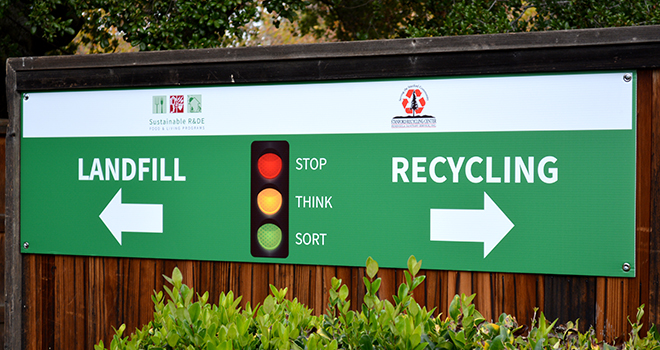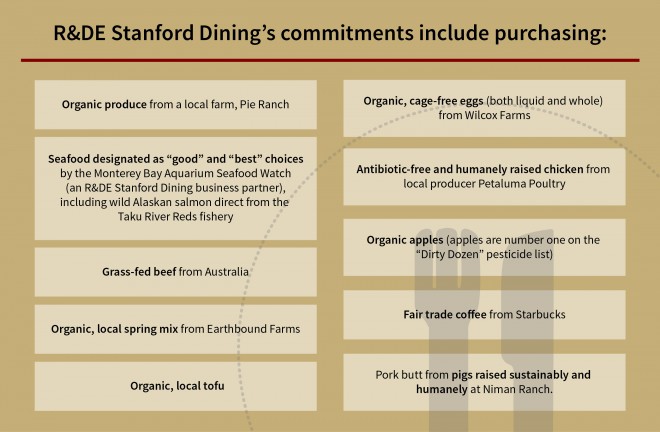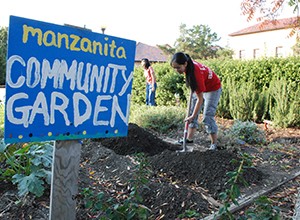As one of Stanford’s largest auxiliary departments, R&DE provides housing and food for over 13,000 students and family dependents, and hosts over 20,000 summer conference visitors each year, in more than 350 buildings that make up one-third of the campus. R&DE is the largest provider of food service on campus, serving more than 4 million meals annually. R&DE’s efforts directly impact student learning, the overall campus culture, and the lives of Stanford’s students after graduation.
An ongoing commitment to having two full-time professionals on staff again in 2015 honors R&DE’s core value that sustainability is a way of life. R&DE Student Housing’s Sustainable Living Program and R&DE Stanford Dining’s Sustainable Food Program are two hallmark sustainability initiatives among many across R&DE. Now in their ninth year, both programs create positive impacts by collaborating with students, staff, faculty, other campus stakeholders, vendors, and suppliers; reporting on sustainability indicators; providing education and outreach for staff and students through lectures and instructional sustainability events; and auditing operational practices and standards for conservation across R&DE.
Results
The Sustainable Living Program is committed to influencing generations of students to lead sustainable lifestyles, not only on campus but in their future communities. R&DE Student Housing does this by providing infrastructure that encourages sustainable living. For example, all residences are equipped with plumbing fixtures that adhere to strict low-flow standards to save water, and they all have access to composting and recycling services. The program also aims to foster behavioral change through residence workshops, competitions, and campaigns that encourage individual action. Students receive creative educational materials on what to bring to campus, how to interact with their building’s heating and cooling systems, how and where to sort waste, and how to report water leaks.
Key programs for R&DE Student Housing in the 2014-15 academic year included the following:
- In response to California’s drought, R&DE Student Housing led an irrigation retrofit project that included replacing all irrigation equipment, over 20,000 pieces, across its 57 acres of landscape with more efficient models; this is expected to save 33 million gallons of water per year, a 46% reduction in R&DE’s irrigation water use. A team of students also conducted water audits in all Row Houses to identify where plumbing fixtures may not meet low-flow standards and identified an additional 1 million gallons in water savings per year.
- The Delta Delta Delta sorority house became the first residence at Stanford to completely eliminate chemical usage for cleaning by installing the Tersano green cleaning system, which uses an ozone-infused water solution that is just as powerful as traditional cleaners. The green cleaner is much safer for custodian and occupant health and reduces the impact of chemicals on the environment.

Zero-waste sorting corral
- The Kappa Sigma fraternity house became the first residence at Stanford completely outfitted to support a zero-waste lifestyle in all spaces. The house’s landfill capacity outside was cut in half, and compost and recycling capacity doubled.
- Fifteen students participated in sustainability internships for the academic year, supporting a variety of sustainability initiatives in residences. For example, one student led focus groups with freshman residents on their New Student Orientation experience and how the values of sustainability could be better conveyed during this critical time. Other students analyzed waste behaviors and contamination at residence waste corrals, and audited lighting and plumbing fixtures.
- The annual Give & Go program, which seeks to reduce waste sent to landfill as students move out at the end of the academic year, introduced a new alpaca mascot and theme (Alpaca my stuff). Student participation increased by 75%, and over 50 tons of materials were donated.
- Compost collection for paper towels in restrooms was added in 11 residences, affecting over 1,000 students.
The new Sustainable Living Video, which showcases the sustainable living community on campus, debuted and serves as an educational training tool on how to engage with sustainability. The video features contributions to sustainable living on campus by an undergraduate student, a graduate student family, a custodian, a chef, a faculty member, and a staff member. The video will be available online as well as shown to incoming first-year and transfer students and at residence meetings.

The Sustainable Food Program is committed to meaningfully participating in the education of the world’s future leaders by sharing knowledge and creating awareness of food culture, systems, and production. R&DE Stanford Dining and R&DE Stanford Hospitality & Auxiliaries are committed to providing healthy and delicious meals that nourish students while supporting a sustainable future and positively influencing lifelong eating behaviors. R&DE favors sourcing products that are local, organic, humanely raised, fairly traded, and from family-owned farms and sustainable fisheries—47% of food purchases are considered sustainable. In collaboration with students, staff, and faculty, the Sustainable Food Program raises awareness through lectures, special events, academic partnerships, and hands-on learning in cooking classes and organic gardens. More than 100 student, staff, and faculty participate in the campus’s BeWell Community Gardens, which R&DE Stanford Dining oversees. Highlights in 2014-15 included the following:
- R&DE Stanford Dining developed a plant-forward and plant-based protein menu for the dining halls, which reduced the amount of animal proteins purchased by 14% and increased plant-based protein purchases by 29%. It also made the following new sustainability commitments: all beef is grass fed with no antibiotics and is from Australia; all chicken (except chicken breasts) is antibiotic and hormone free, humanely raised, and local from Petaluma Poultry; and many produce items, including kale and beets, come from a local, organic, educational farm, Pie Ranch. In recognition of efforts thus far, Stanford was voted peta2’s Favorite Vegan-Friendly College for 2015.
- R&DE Stanford Dining created a drought response plan and reduced domestic water use by 9% in 2014 as compared to the year before through staff trainings, student education, and the purchase of new, efficient equipment, including dishwashers. Stanford Dining’s switch to Australian beef saves over 50 million gallons of water in California, given the high water footprint of raising cattle. Because the beef is transported by boat, emissions from transport of the product are minimal. R&DE Stanford Hospitality & Auxiliaries reduced towel and linen usage and heightened maintenance to fix leaky faucets in the Stanford Guest House, and Stanford Catering introduced spa water stations to replace water bottles at catering events.
- R&DE Stanford Dining cofounded, with the Culinary Institute of America, the Menus of Change University Research Collaborative, an organization of university business leaders, faculty, food service directors, and chefs from universities across the country who work together on research and education to advance healthier, more sustainable lifelong food choices among students. Additionally, R&DE Stanford Dining cofounded the Bay Area Sustainable Sourcing Group with Google, bringing purchasers and educators in the Bay Area together six times a year to share ideas and learn about different sustainability topics.
- R&DE Stanford Dining launched the Teaching Kitchen @ Stanford with the Jamie Oliver Food Foundation in January 2015. Students are taught the fundamentals of cooking delicious and healthy meals, learning how to eat more sustainably while building confidence in their cooking skills. Additional cooking classes included a Farm to Fork series offered in partnership with sustainable suppliers such as Niman Ranch, Pie Ranch, and the Taku River Reds fishery. Classes included a hands-on component.

Students installing LED lights in the dining hall
- Florence Moore Dining Hall was certified sustainable by the Green Restaurant Association, and R&DE Stanford Dining won a Hobart national sustainability award for its comprehensive sustainability program, including purchasing, education, and energy and water reduction. Stanford Dining was the first university program to receive the U.S. Healthful Foods Council Responsible Epicurean and Agricultural Leadership (REAL) Certification for wellness and sustainability.
- R&DE Stanford Dining replaced 1,475 lightbulbs in the dining halls with LED bulbs, which will save over 125,000 kilowatt-hours and $17,000 in electricity costs every year. The lighting retrofit project was paid for by Stanford’s Energy Retrofit Program rebates.
Academic Integration
R&DE supports students and faculty interested in conducting academic research throughout its facilities. This year, R&DE Student Housing and R&DE Stanford Dining partnered with students and faculty from the departments of Sociology, Civil & Environmental Engineering, and Psychology, as well as the Stanford Woods Institute for the Environment, the Stanford Persuasive Tech Lab, the School of Education, and the Hasso Plattner Institute of Design at Stanford, to research and create behavior change campaigns around reducing energy and water consumption in on-campus residences.
R&DE Stanford Dining partnerships involved multiple classes and students working on food waste best practices, including the second iteration of a class at Stanford Law School with Professor Emeritus Paul Brest. Still more partnerships with faculty and students are being explored on topics such as the potential impacts of normative messaging, social networks, and tools such as shower timers on energy and water conservation behaviors in residences.
R&DE works with many organizations on campus to benefit from the extensive resources of Stanford’s renowned faculty. R&DE’s program includes sponsoring a faculty speaker series, partnering with faculty to teach in various classes throughout the university, and promoting food as a multidisciplinary educational experience. R&DE engages students in food issues such as those related to health, the environment, social equity, and the global economy. Examples of these offerings include the Food Summit (an interdisciplinary food conference involving all seven schools at Stanford) and the Farm to Fork lecture/workshop series.

Working in the garden
In addition, R&DE hires a group of student gardeners each year to manage seven organic gardens across campus. These gardens, strategically located adjacent to campus dining halls, are designed to provide an experiential model of the food system for students to observe at every meal.
R&DE also supports student groups, students working on class projects, and student interns implementing projects within residences and dining halls. For example, R&DE provides the student-run Green Living Council with funding, staff mentors, and access to utility data, among other resources, to help the students educate their peers about sustainable living and implement sustainable practices in their residences.
Looking Ahead
R&DE’s sustainability programs strive to continuously integrate sustainability throughout the campus experience and into everyone’s lifestyle at Stanford. Partnerships with academic channels will remain a priority and will continue to grow as the new Educational Farm, a six-acre farm focused on education and research on small-scale agriculture, comes online. Establishing a hands-on, credit-based curriculum that utilizes the unique urban environment of the campus as a teaching tool is a key priority in the coming years. Through partnerships with faculty, researchers, and student groups, R&DE will expand opportunities for students to design, implement, and manage sustainable food and living initiatives, and to develop creative design solutions that promote and encourage healthy and sustainable behaviors in the dining halls and residences.
As the university’s metering and real-time data monitoring systems expand, utilities management will become increasingly more transparent and prominently featured throughout these efforts. R&DE will continue to build on success from this year to retrofit residences and dining halls with the most efficient lighting, appliances, and infrastructure to ensure maximum savings, while expanding green cleaning practices and supporting Stanford’s path to zero waste with innovative solutions and widespread implementation of recycling and composting in all residences.
A new Harvest of the Month program will educate students about seasonality through multiple channels, including cooking classes, tastings, and signage, and the university will continue to develop an animal protein reduction strategy that uses some of the best practices uncovered through these faculty and student partnerships.




